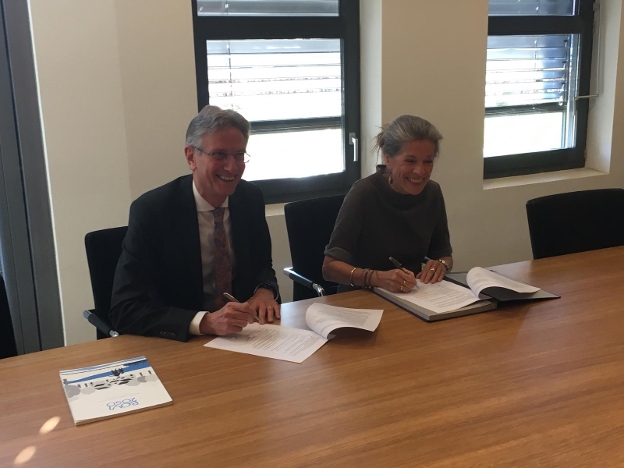Cookies
Van Hall Larenstein treats its customers' information with the utmost care and will never make this information available to third parties. Read more about us Privacy and Cookie Policy
VHL University of Applied Sciences (VHL) and the Vallei en Veluwe water board are to jointly launch a new professorship. This is the first time that a water board will conduct applied research in an educational institution via an applied research group such as this. The applied research group, Sustainable Water Systems in the Environment and Planning Act, is part of the renewed four-year partnership between VHL and the Vallei en Veluwe water board, and is in line with the recently introduced Blue Environmental Vision 2050. The cooperation agreement was signed this week.
Tanja Klip-Martin, chair of the Vallei en Veluwe water board: ‘We live in a densely populated delta in the Netherlands. Soil and subsurface form one spatial system with the topsoil, with water as an important guiding principle. This means that water also has an important connecting role in the Environment Act. This partnership with VHL is therefore a wonderful interpretation of the Blue Environmental Vision 2050 which we have developed, where we regard the exchange of knowledge and cooperation with partners that transcends boundaries as a matter of course.’
Paul van Eijk fulfils the role of lecturer at the water board. Van Eijk adds: ‘Water is an important carrier of the challenge of spatial transition presented by the Environment Act. A great deal of knowledge and insight is still required into how sustainable water systems contribute to the purpose of the new Environment Act. With this research group, we are conducting practice-oriented research into this and use the room to experiment for the next four years.’
At a national level, the water boards have agreed to strengthen their ties with educational institutions. According to Peter van Dongen, chairman of the Executive Board of VHL: ‘Water boards will offer students more opportunities for internships and graduation assignments. The applied research group is an example of intensifying cooperation with a knowledge institute such as VHL, the greenest university of applied science in the Netherlands.’
Students in the research group can participate in the Xplorelab; an innovation-knowledge workplace of the water board. Here, knowledge questions from practice are connected with planning and theory. Van Eijk: ‘For example, we look at how water systems in environmental visions, environmental plans and programmes can contribute to the sustainable development of the living environment.’ In a knowledge workplace, students not only gain knowledge, but they also learn skills that match the tasks of water boards.
The Vallei en Veluwe water board developed the Blue Environmental Vision 2050, inspired by the new Environment and Planning Act earlier this year. Using this vision, the water board will work with partners such as municipalities and provinces to anchor water in the plans for our living environment. The Blue Environmental Vision 2050 focuses on major social themes such as climate change, energy transition, the circular economy, agricultural reforms, nature issues and urbanisation. Read more about the Blue Environmental Vision at www.bovi2050.nl.
